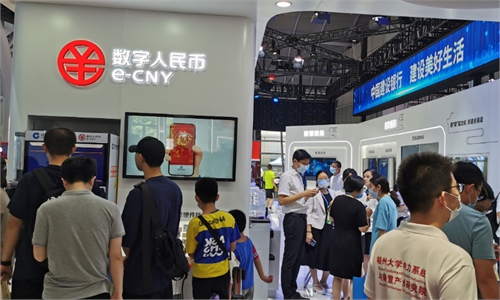Shanghai Clearing House launches digital yuan clearing and settlement services for bulk commodity business

The mascot of digital yuan Photo: VCG
The digital yuan has made headway in the commodities market, with Shanghai Clearing House announcing that it would launch the digital yuan for clearing and settlement services for bulk commodity trading starting Monday.Experts said the move is expected to promote the digital yuan's use in the commodities market and support the country's broader digital currency usage.
The bulk commodity spot clearing business of Shanghai Clearing House will offer digital yuan clearing and settlement services from Monday, with no fees charged for the digital currency clearing and settlement services for the time being, according to a noticed on its website.
The launch of the services will make cross-border settlement of bulk commodities more secure, faster, more efficient, and more cost-effective for financial institutions and service providers, Dong Dengxin, director of the Finance and Securities Institute of the Wuhan University of Science and Technology, told the Global Times on Sunday.
China has grown to become the world's largest buyer of a number of commodities, so the move will also facilitate the internationalization of the Chinese currency, and provide the world with a trusted clearing system, Dong noted.
The move comes as the digital yuan has been making significant strides in its development and adoption in various sectors.
The digital yuan has also been gaining traction in the Hong Kong Special Administrative Region (HKSAR). Chan Mo-po, finance secretary of the HKSAR, wrote in a blog post on Sunday that the cooperation with the People's Bank of China, the country's central bank, on cross-border retail payments in the digital yuan has entered the second phase of testing.
The goal of the test is to use the Faster Payment System, a real-time gross settlement payment system in Hong Kong, to charge the digital yuan wallet, so that Hong Kong residents can use the digital yuan in the mainland in the future, Howard Lee, deputy chief executive of the Hong Kong Monetary Authority, explained earlier.
In addition, the digital yuan has also been gaining traction in the subway transportation sector, even under the conditions where there is no electricity or network coverage. Two metro stations in Qingdao, East China's Shandong Province, became the first pair in the country to complete trial payments on Tuesday.
The digital yuan has also been gaining popularity in e-commerce, with China's e-commerce giant JD.com Inc reporting a 216 percent year-on-year increase in digital yuan users during the recent "618" (June 18) shopping festival. The platform also saw a 254 percent surge year-on-year in the number of transactions using digital yuan.
It is noteworthy that the digital yuan has seen significant progress in its adoption, expanding from the pilot phase in retail shopping to trade, and from individual consumers to companies, Dong said.
Dong said that the future development of the digital currency depends on strong technological support, research and development, expansion and promotion in encryption technology, artificial intelligence, and digital security.
"This process will not be completed overnight, but China is relatively advanced in this field," Dong said.
China International Capital Corporation predicted in a research report that the digital yuan will enter a period of rapid development in the next three years and is expected to be used in more digital economy segments.



